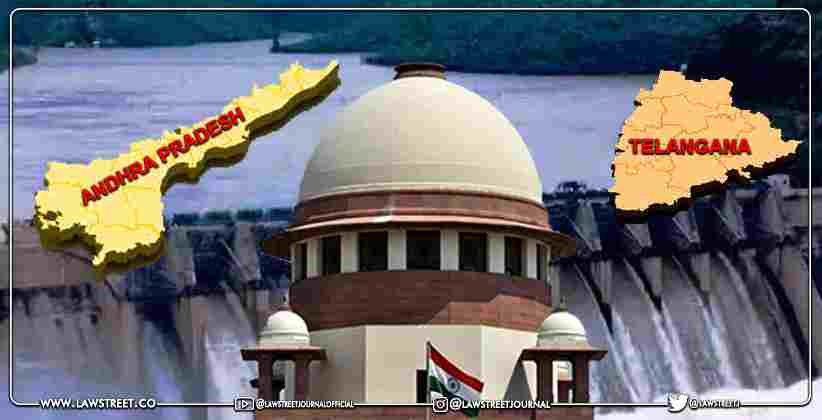The state of Andhra Pradesh has filed a writ petition with the Supreme Court regarding a water-sharing dispute with the state of Telangana.
The writ petition requests that the Union of India notify the Krishna River Management Board (KRMB) of its jurisdiction pursuant to Section 87 of the Andhra Pradesh Reorganisation Act, 2014. It also requested that KRMB follow the decision of the Krishna Water Disputes Tribunal (KWDT-I) until their jurisdiction is recognised.
The KWDT decision, made under Sections 5(2) and 5(3) of the Inter-State River Water Disputes Act, 1956 (Act, 1956), granted the erstwhile State of Andhra Pradesh the liberty to use surplus flows above 75 percent dependable flows, but without any right to do so. The allocation to the former state of AP was 800 TMC, and the return flows totaled 811 TMC.
This decision was upheld by the Krishna Water Disputes Tribunal II in 2004. (KWDT-II).Following the 2014 division of the erstwhile State of Andhra Pradesh into the States of Andhra Pradesh and Telangana, the two states agreed that the 811 TMC allocation made by the KWDT-I would be apportioned in such a way that the State of Telangana would receive 299 TMC and the State of Andhra Pradesh would receive 512 TMC. This agreement (2015 Agreement) was previously signed and is being monitored by KRMB.
The current petition stems from an allegation that the State of Telangana is indiscriminately drawing water for power purposes, in violation of the Reservoirs' integrated operation rules and the provisions of the 2015 Agreement.
Advocate G Umapathy drafted the petition, which was settled by Senior Advocate Dushyant Dave and filed through Advocate Mahfooz Nazki.
KRMB's Jurisdiction:
Section 87 of the 2014 Act addresses the Board's jurisdiction, stating that the Board will ordinarily exercise jurisdiction on the "Godavari and Krishna rivers in regard to any of the projects over head works (barrages, dams, reservoirs, regulating structures), part of the canal network, and transmission lines necessary to deliver water or power to the States concerned, as the Central Government may notify, having regard to any awards made by the Tribunals established under the Inter-State River Water Disputes Act, 1956."
According to Section 87 (1), the Board can only exercise jurisdiction over aspects that have been notified by the Central Government. The petitioner's complaint, however, is that such a Notification has yet to be issued. The notification for "Jurisdiction of Krishna River Management Board" was suggested by the Government of Andhra Pradesh and agreed to by the Secretary, Water Resources, Government of India in a 2020 meeting between the two states and the Government of India. The Apex Council also agreed that the Government should notify the GRMB and KRMB of India of their jurisdiction. Since then, there have been a number of KRMB meetings, but none have resulted in a fruitful resolution.
According to the petition, the Center's inaction is seriously affecting the "interests of the inhabitants of the Petitioner State who rely on the waters of the River Krishna." Over the past seven years, there has been an excessive delay in carrying out its statutory functions.
Telangana State Generating Hydel Power Up to 100% Installed Capacity:
According to the petition, Telangana is seriously affecting water supply to Andhra Pradesh for irrigation and other purposes because there has been no progress in notifying the jurisdiction of the KRMB.This has resulted in severe depletion in the Srisailam Dam project due to the use of water from there for power generation in Telangana State, as determined by "daily readings" submitted by the dam's authorities.
The Ministry of Jal Shakti advised the Director (Hydel), TSGENCO, to halt further water releases through the Srisailam Left Power House immediately and to follow the water release orders issued by KRMB, except in cases of extreme grid urgency.
Rather than complying, Telangana has issued a notification notifying a decision to generate Hydel Power in the State up to 100 percent installed capacity and passing appropriate TSGENCO directions.According to the petition, the State of Telangana lacks jurisdiction because it has "no control over the common reservoirs Srisailam and Nagarjunasagar, and storage in these reservoirs is common storage."
According to the petition, "this has caused immense hardship for the people of the State of Andhra Pradesh as water availability has been seriously harmed by depletion in the Srisailam Dam project as well as other projects such as the Nagarjuna Sagar Project and the Pulichintala Project."








